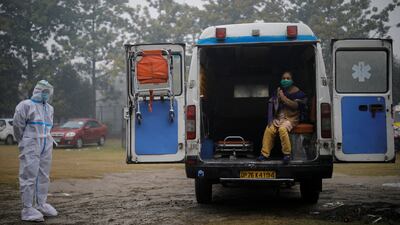The Indian capital will remain under lockdown at weekends after it recorded a sharp rise in coronavirus cases blamed on the Omicron variant.
Delhi and southern Karnataka state announced the drastic measures after night curfews and curbs on public movement failed to curtail the spread of the highly transmissible strain.
More than 58,000 fresh infections were reported in India on Wednesday, the health ministry said, a six-fold rise in seven days.
About 500 fatalities were also reported, taking the total death toll to 483,000 and coronavirus caseload to nearly 35 million.
Nearly 10,665 of these cases were from Delhi, where infection rates were below 500 until Tuesday last week. India confirmed it's first Omicron death on Wednesday.
A man identified as 73-year-old Laxminarayan Nagar from Udaipur in western Rajasthan state died on December 31, health ministry official Luv Agarwal confirmed.
"Our protocol says that we treat it as a covid death if they test positive, here also since he was tested positive for Omicron, we treat it as Omicron death," Mr Agarwal said.
The state government had previously claimed that he died of non-Covid complications and was suffering from comorbidities.
Delhi chief minister Arvind Kejriwal also tested positive. The capital's health minister Satyendar Jain said 81 per cent of the cases reported there were the Omicron strain.
He said the third wave of the pandemic had already set in and the city would see 10,000 fresh cases by Wednesday evening.
The state government imposed a night curfew last month, closed schools and colleges, and ordered markets and public transport to operate at half their capacity.
But the earlier measures failed to curtail the spread of the virus. The proportion of tests coming back positive hit 10 per cent, forcing the government to bring back the curfew.
“There will be a weekend curfew in Delhi. Coronavirus is spreading fast, " Mr Jain said, but urged people not to panic.
Delhi was placed under a coronavirus curfew last year after a wave of Covid-19 infections, with daily cases passing the 30,000 mark.
The second wave driven by the local Delta variant hit the city of 20 million residents and large swathes of India in April and May. It left the country's underfunded healthcare system on the brink of collapse.
As infection rates shot up, regional governments imposed lockdowns, causing an exodus of millions of migrant casual workers from big cities such as Delhi and Mumbai in a repeat of India's first nationwide lockdown in 2020.
Critics blamed Prime Minister Narendra Modi's central and regional government for acting late despite warnings of a second wave. They say the government failed to save tens of thousands of lives as hospitals and crematoriums ran out of space across the country.
But in recent weeks, authorities have been proactive in dealing with the surge in cases amid the threat of a third wave.
Health experts and the government have said the country is likely to face a third wave around February, driven by the Omicron variant first detected in South Africa.
So far, death and hospital admission rates have remained low but experts say authorities cannot let their guard down.
“My sister has been infected … I feel it is a right decision to impose the curbs considering what happened in the last wave,” Aditi Singh, a resident of Delhi, told The National.
Authorities in Karnataka said a state-wide weekend curfew will be imposed to battle the infection surge. The state reported the country's first case of Omicron on December 2.
It has since recorded a rapid rise in the number of infections, with more than 2,000 reported in the last 24 hours.
Officials in western Mumbai, where more than 10,500 cases were reported on Tuesday, said a lockdown could be imposed if daily infection numbers exceed 20,000.
It made RT-PCR tests mandatory for all international passengers arriving at Mumbai Airport and imposed a compulsory seven-day home quarantine for those who test negative and institutional quarantine for positive patients.











